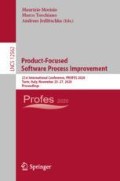Abstract
Artificial intelligence (AI) has become a fast-growing trend. Increasingly, organizations are interested in developing AI systems, but many of them have realized that the use of AI technologies can raise ethical questions. The goal of this study was to analyze what kind of ethical guidelines companies have for solving potential ethical issues of AI and developing AI systems. This paper presents the results of the case study conducted in three companies. The ethical guidelines defined by the case companies focused on solving potential ethical issues, such as accountability, explainability, fairness, privacy, and transparency. To analyze different viewpoints on critical ethical issues, two of the companies recommended using multi-disciplinary development teams. The companies also considered defining the purposes of their AI systems and analyzing their impacts to be important practices. Based on the results of the study, we suggest that organizations develop and use ethical guidelines to prioritize critical quality requirements of AI. The results also indicate that transparency, explainability, fairness, and privacy can be critical quality requirements of AI systems.
Access this chapter
Tax calculation will be finalised at checkout
Purchases are for personal use only
References
Alexander, I.: Misuse cases: use cases with hostile intent. IEEE Softw. 20, 58–68 (2003)
Arnold, T., Scheutz, M.: The “big red-button” is too late: an alternative model for ethical evaluation of AI systems. Ethics Inf. Technol. 20(1), 59–69 (2018)
Aydemir, F.B., Dalpiaz, F.: A roadmap for ethics-aware software engineering. In: ACM/IEEE International Workshop on Software Fairness (FairWare 2018), pp. 15–21 (2018)
Bonnemains, V., Claire, S., Tessier, C.: Embedded ethics: some technical and ethical challenges. Ethics Inf. Technol. 20(1), 41–58 (2018)
Bostrom, N., Yudkowsky, E.: The ethics of artificial intelligence. In: Frankish, K., Ramsay, W.M., (eds.) Cambridge Handbook of Artificial Intelligence, pp. 316–334. Cambridge University Press (2011)
Boyce, C., Neale, P.: Conducting in-depth interviews: a guide for designing and conducting in-depth interviews. Evaluation 2(May), 1–16 (2006)
Cassell, C., Symon, G.: Essential Guide to Qualitative Methods in Organizational Research. SAGE Publications, London (2012)
Charmaz, K.: Constructing Grounded Theory: A Practical Guide Through Qualitative Analysis. SAGE Publications, London (2006)
Chazette, L., Karras, O., Schneider, K.: Do end-users want explanations? Analyzing the role of explainability as an emerging aspect of non-functional requirements. In: RE 2019, pp. 223–233 (2018)
Chazette, L., Schneider, K.: Explainability as non-functional requirement: challenges and recommendations. Requirements Eng. (2020)
Cysneiros, L.M., Raffi, M.A., Leite, J.C.S.P.: Software transparency as a key requirement for self-driving cars. In: RE 2018, pp. 382–387 (2018)
Cysneiros, L.M., do Prado Leite, J.C.S.: Non-functional requirements orienting the development of socially responsible software. In: Nurcan, S., Reinhartz-Berger, I., Soffer, P., Zdravkovic, J. (eds.) BPMDS/EMMSAD -2020. LNBIP, vol. 387, pp. 335–342. Springer, Cham (2020). https://doi.org/10.1007/978-3-030-49418-6_23
Dignum, V.: Ethics in artificial intelligence: introduction to the special issue. Ethics Inf. Technol. 20(1), 1–3 (2018)
Doyle, T., Veranas, J.: Public anonymity and the connected world. Ethics Inf. Technol. 16(3), 207–218 (2014). https://doi.org/10.1007/s10676-014-9346-5
Eisenhardt, K.M.: Building theories from case study research. Acad. Manage. Rev. 14(4), 532–550 (1989)
Elia, J.: Transparency rights, technology, and trust. Ethics Inf. Technol. 11, 145–153 (2009)
Etzioni, A., Etzioni, O.: AI assisted ethics. Ethics Inf. Technol. 18(2), 149–156 (2016). https://doi.org/10.1007/s10676-016-9400-6
European Commission: Ethics Guidelines for Trustworthy AI. https://ec.europa.eu/futurium/en/ai-alliance-consultation/guidelines. Accessed 24 Jan 2020
IEEE: Ethically Aligned Design, First Edition https://ethicsinaction.ieee.org/. Accessed 24 Nov 2019
Floridi, L., Cowls, J., Beltramatti, M., et al.: AI4people: an ethical framework for a good AI society: opportunities, risks, principles, and recommendations. Mind. Mach. 28, 689–707 (2018)
Horkoff, J.: Non-functional requirements for machine learning: challenges and new directions. In: International Requirements Engineering Conference, pp. 386–391 (2019)
Jobin, A., Lenca, M., Vayena, E.: The global landscape of AI ethics guidelines. Nat. Mach. Intell. 1, 389–399 (2019)
Jones, S., Hara, S., Augusto, J.C.: eFRIEND: an ethical framework for intelligent environment development. Ethics Inf. Technol. 17, 11–25 (2015)
Mepham, B., Kaiser, M., Thorstensen, E., Tomkins, S., Millar, K., et al.: Ethical Matrix Manual (2006)
Open Data Institute: Data Ethics Canvas. https://theodi.org/wp-content/uploads/2019/07/ODI-Data-Ethics-Canvas-2019-05.pdf. Accessed 24 Jun 2020
Palm, E.: Securing privacy at work: the importance of contextualized consent. Ethics Inf. Technol. 11, 233–241 (2009)
Peslak, A.R.: Improving software quality: an ethics-based approach. In: SIGMS 2004, pp. 144–149 (2004)
Pieters, W.: Explanation and trust: what to tell the user in security and AI? Ethics Inf. Technol. 13, 53–64 (2011)
Rahwan, I.: Society-in-the-loop: programming the algorithmic social contract. Ethics Inf. Technol. 20(1), 5–14 (2018)
Royakkers, L., Timmer, J., Kool, L., van Est, R.V.: Societal and ethical issues of digitization. Ethics Inf. Technol. 20, 1–16 (2018). https://doi.org/10.1007/s10676-018-9452-x
SIIA (Software and Information Industry Association): Ethical Principles for Artificial Intelligence and Data Analytics, pp. 1–25 (2017)
Stanford University: One hundred year study on artificial intelligence (AI100). In: Artificial Intelligence and Life in 2030. Stanford University. https://ai100.stanford.edu/. Accessed 15 Dec 2019
Vampley, P., Dazeley, R., Foale, C., et al.: Human-aligned artificial intelligence in a multi objective problem. Ethics Inf. Technol. 20(1), 27–40 (2018)
Yin, R.K.: Case Study Research Design and Methods. Sage, Thousand Oaks (2013)
Author information
Authors and Affiliations
Corresponding author
Editor information
Editors and Affiliations
Rights and permissions
Copyright information
© 2020 Springer Nature Switzerland AG
About this paper
Cite this paper
Balasubramaniam, N., Kauppinen, M., Kujala, S., Hiekkanen, K. (2020). Ethical Guidelines for Solving Ethical Issues and Developing AI Systems. In: Morisio, M., Torchiano, M., Jedlitschka, A. (eds) Product-Focused Software Process Improvement. PROFES 2020. Lecture Notes in Computer Science(), vol 12562. Springer, Cham. https://doi.org/10.1007/978-3-030-64148-1_21
Download citation
DOI: https://doi.org/10.1007/978-3-030-64148-1_21
Published:
Publisher Name: Springer, Cham
Print ISBN: 978-3-030-64147-4
Online ISBN: 978-3-030-64148-1
eBook Packages: Computer ScienceComputer Science (R0)

